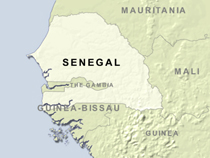-
(单词翻译:双击或拖选)
Dakar
16 February 2007
Despite efforts by health officials to stop the HIV virus from being passed from a mother to her child, children in Africa are still at high risk of infection. HIV, the Human Immunodeficiency Virus, causes AIDS. If infected, children face a greater risk of death from AIDS than adults. Phuong Tran reports from Dakar on the challenges of stopping the disease from being passed to the next generation.
 |
At birth, he was infected with HIV through his mother, who does not know how she became infected.
Fatoumah says for the first year of her son's life, he was always sick. She did not know why, until someone suggested that both she and her son get tested for HIV.
The tests came back positive for both.
Ngagne Mbaye has treated HIV infected children and their families for more than one decade. The doctor says most women do not know what HIV is, much less that their unborn children may be at risk.
Mbaye says despite a program in Senegal aggressively promoted to put an end to pregnant women passing on the virus to their children, the problem continues.
"Health workers are not trained or are not committed or do not have time to provide counseling to pregnant women in the health facilities," explains Mbaye. " Even if it is done, we have problems to have access to the laboratory for the tests. Even if the tests [are] done, if the woman is seropositive, there [are] a lot of problems to have good follow up."
Mbaye says without complete follow up, the child's infection risk is high.
"She [the mother] has to give birth in a good facility. During the labor1 she has to take drugs to dramatically reduce the risk of transmission during this critical period. We have to give drugs to the child," he explains.
The doctor estimates 50 percent of children infected with HIV will not make it to five years old.
Radiyah is the four year old sister of the infected boy. She does not have the virus, but is what health officials call "affected2", a vulnerable child whose life is put at risk even though HIV negative.
Dr. Mbaye says when mothers are sick, they often do not take their children in for vaccinations3 on time. And if the child is really sick, the mother will not bring the child to the emergency room because they themselves are sick.
Fatoumah, the HIV-infected mother, says it has been hard for her to take care of her children when not everyone in her family knows she has HIV.
"When I have to go to the hospital, I ask my brother or sister to take care of my kids,," she says. "Since they do not know I have HIV, they ask why I keep going to the hospital? They tease me that I like the hospital so much. I have started to lie to them about where I go, but I am running out of places to tell them."
Senegal's Ministry4 of Health reports close to 6,000 children under age 15 are infected with HIV.
According to the United Nations AIDS Program, two million children in Sub-Saharan African are living with HIV, and only one in ten of them receives treatment.
Health officials say it is harder to estimate the number of children who though not infected, are touched by the disease.
 收听单词发音
收听单词发音
1
labor

|
|
| n.劳动,努力,工作,劳工;分娩;vi.劳动,努力,苦干;vt.详细分析;麻烦 | |
参考例句: |
|
|
|
2
affected

|
|
| adj.不自然的,假装的 | |
参考例句: |
|
|
|
3
vaccinations

|
|
| n.种痘,接种( vaccination的名词复数 );牛痘疤 | |
参考例句: |
|
|
|
4
ministry

|
|
| n.(政府的)部;牧师 | |
参考例句: |
|
|
|















